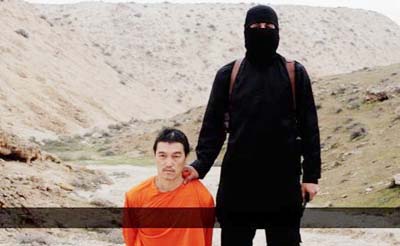
BBC, Tokyo :
Japan has reacted with anger and defiance to a video appearing to show the beheading of Japanese hostage Kenji Goto by an Islamic State militant.
Prime Minister Shinzo Abe said Japan “would not give in to terrorism” and that he would expand his support to countries fighting IS.
IS has cited Japanese aid as a reason for the hostage taking.
The video comes less than a week after the apparent beheading of another Japanese man, Haruna Yukawa.
Mr Goto, 47, a respected journalist known for his work covering the suffering of civilians in war zones, went to Syria in October, reportedly to try to secure Mr Yukawa’s release.
The video, which has all the hallmarks of previous IS propaganda videos, has not been authenticated, but Japanese officials believe it is genuine.
In the video, Mr Goto is seen kneeling in an orange jumpsuit.
A militant speaking with an English accent who is believed to have appeared in previous videos and is known as “Jihadi John”, addresses Mr Abe, accusing him of a “reckless decision to take part in an unwinnable war”.
Mr Abe called the killing a “heinous act”, adding that Japan would work with the international community to bring those responsible for Mr Goto’s apparent murder to justice.
There has been strong condemnation from the US and other allies in the fight against IS.
Mr Goto’s mother Junko Ishido said she was speechless at his death, saying he had gone to Syria out of “kindness and courage”.
“I was hoping Kenji would come back alive,” his brother Junichi told Japanese broadcaster NHK TV.
Japanese officials had been working with Jordan to secure the release of Mr Goto and a Jordanian pilot, Lt Moaz al-Kasasbeh, who was shot down over Syria in December.
However, earlier on Saturday they said negotiations had become deadlocked.
An IS video released on Tuesday had said Mr Goto had “only 24 hours left to live” and Lt Kasasbeh “even less”.
They later gave a deadline of sunset on Thursday for a deal by which Mr Goto would be freed in return for Jordan releasing captured Iraqi militant Sajida al-Rishawi.
But the deal may have been complicated by Jordan’s demand that Lt Kasasbeh also be released. An adviser to the Japanese PM, Tomohiko Tanguchi, said his country had never made direct contact with IS throughout the negotiations.
The militants had initially demanded a $200m (£130m) ransom for the two Japanese hostages, the same as Mr Abe pledged in in non-military aid for countries fighting Islamic State.
The latest video gave no mention of Lt Kasasbeh’s fate: his family said they were praying he was safe and urged the Jordanian government to do more to secure his release.
Yassin Rawashda, an uncle of the pilot, said: “We want the government to tell us the truth.”
The information ministry said on Sunday it was still working for the release of Lt Kasasbeh and repeated that it was prepared to exchange Sajida al-Rishawi.
Japan has reacted with anger and defiance to a video appearing to show the beheading of Japanese hostage Kenji Goto by an Islamic State militant.
Prime Minister Shinzo Abe said Japan “would not give in to terrorism” and that he would expand his support to countries fighting IS.
IS has cited Japanese aid as a reason for the hostage taking.
The video comes less than a week after the apparent beheading of another Japanese man, Haruna Yukawa.
Mr Goto, 47, a respected journalist known for his work covering the suffering of civilians in war zones, went to Syria in October, reportedly to try to secure Mr Yukawa’s release.
The video, which has all the hallmarks of previous IS propaganda videos, has not been authenticated, but Japanese officials believe it is genuine.
In the video, Mr Goto is seen kneeling in an orange jumpsuit.
A militant speaking with an English accent who is believed to have appeared in previous videos and is known as “Jihadi John”, addresses Mr Abe, accusing him of a “reckless decision to take part in an unwinnable war”.
Mr Abe called the killing a “heinous act”, adding that Japan would work with the international community to bring those responsible for Mr Goto’s apparent murder to justice.
There has been strong condemnation from the US and other allies in the fight against IS.
Mr Goto’s mother Junko Ishido said she was speechless at his death, saying he had gone to Syria out of “kindness and courage”.
“I was hoping Kenji would come back alive,” his brother Junichi told Japanese broadcaster NHK TV.
Japanese officials had been working with Jordan to secure the release of Mr Goto and a Jordanian pilot, Lt Moaz al-Kasasbeh, who was shot down over Syria in December.
However, earlier on Saturday they said negotiations had become deadlocked.
An IS video released on Tuesday had said Mr Goto had “only 24 hours left to live” and Lt Kasasbeh “even less”.
They later gave a deadline of sunset on Thursday for a deal by which Mr Goto would be freed in return for Jordan releasing captured Iraqi militant Sajida al-Rishawi.
But the deal may have been complicated by Jordan’s demand that Lt Kasasbeh also be released. An adviser to the Japanese PM, Tomohiko Tanguchi, said his country had never made direct contact with IS throughout the negotiations.
The militants had initially demanded a $200m (£130m) ransom for the two Japanese hostages, the same as Mr Abe pledged in in non-military aid for countries fighting Islamic State.
The latest video gave no mention of Lt Kasasbeh’s fate: his family said they were praying he was safe and urged the Jordanian government to do more to secure his release.
Yassin Rawashda, an uncle of the pilot, said: “We want the government to tell us the truth.”
The information ministry said on Sunday it was still working for the release of Lt Kasasbeh and repeated that it was prepared to exchange Sajida al-Rishawi.

